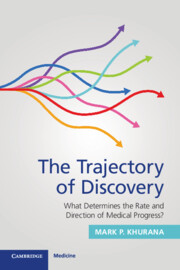‘With engaging examples and a surprising breadth of research, The Trajectory of Discovery, brilliantly illuminates how both the rate and trajectory of medical research rests on the incentives built into the scientific system and the social context in which research takes place. Khurana deftly applies a host of classical and new findings from across scientometrics, sociology of science, and the economics of innovation to the medical area and highlight why we (don’t) know what we (don’t) know. Through examples, theory, and empirical research, the book argues that discovery rests crucially on the aggregated choices of many scientists, whose actions are shaped by the social logic of scientific system - a logic that is not necessarily optimized for this endeavor. It will be a great read for social scientists interested in the intricacies of medical science, or doctors in search for explanations of why science works the way it does.’
Emil Bargmann Madsen - Postdoctoral Researcher, Danish Centre for Studies in Research and Research Policy, Aarhus University
‘The rate and direction of medical progress remain neglected topics for systematic study. Mark P. Khurana's The Trajectory of Discovery shines the spotlight on such issues and makes this what is likely to be the most important book on both biomedicine and science policy this year.’
Tyler Cowen - Professor of Economics, George Mason University
‘A compelling route into the contemporary world of science. With plenty of illuminating examples from biomedical research, Khurana gives us an insider’s view into how prizes, important discoveries, easily-accessible tools, funding bubbles, temporary emergencies and crises have long-term effect on what scientists study, and contribute to determine whether science will ultimately progress or sluggish. It shows how patients’ groups, philanthropic institutions, corporate lobbies and governments can have a say into what gets prioritized and discusses how some of the current obsessions of science, such as having positive findings, publishing first and cumulate citations pose additional frictions. The final portrait is a world where little room, if any, is left to academic freedom.’
Chiara Franzoni - Professor of Applied Economics, School of Management, Polytechnic University of Milan
‘This book is well worth the read, particularly for those heading into the research sector, but also for anyone curious about the history of medical discovery … Recommended.’
D. C. Stewart
Source: Choice



